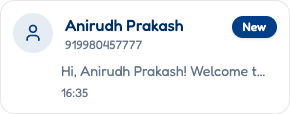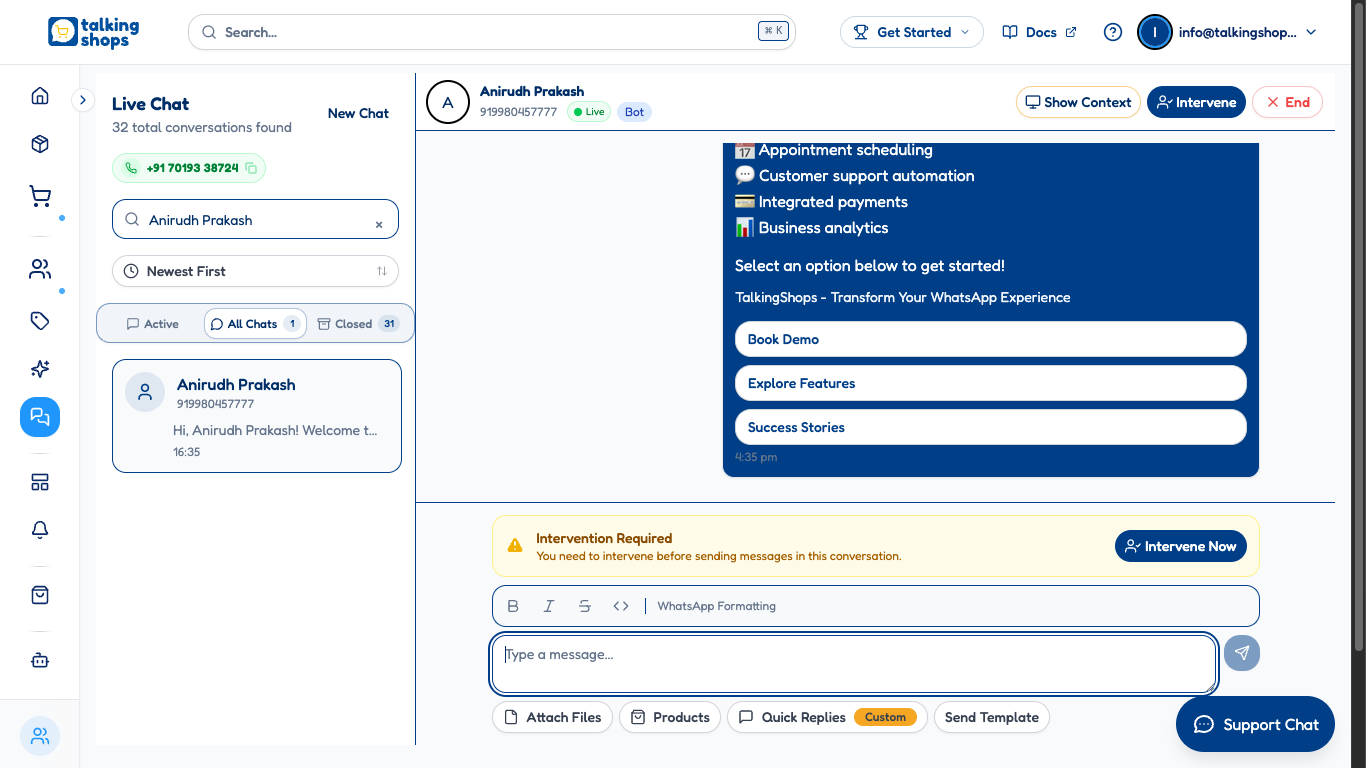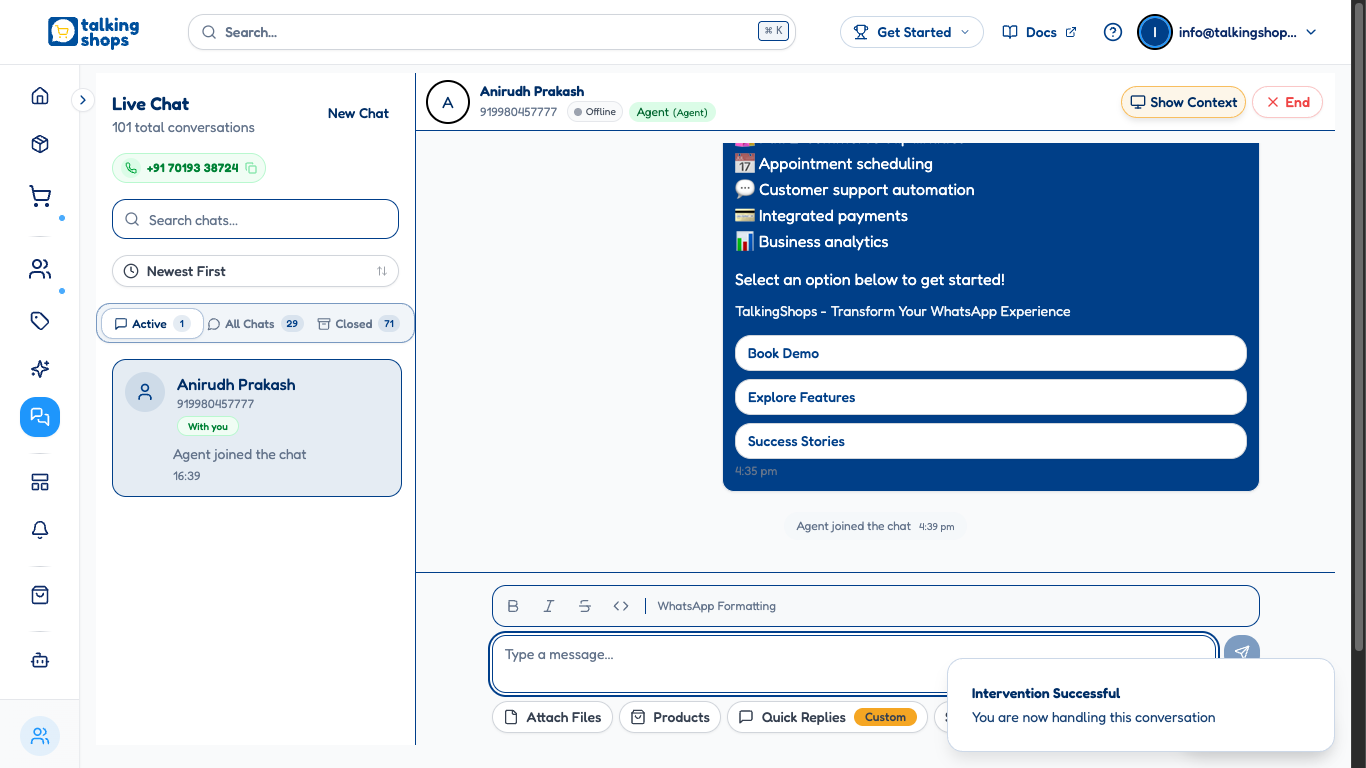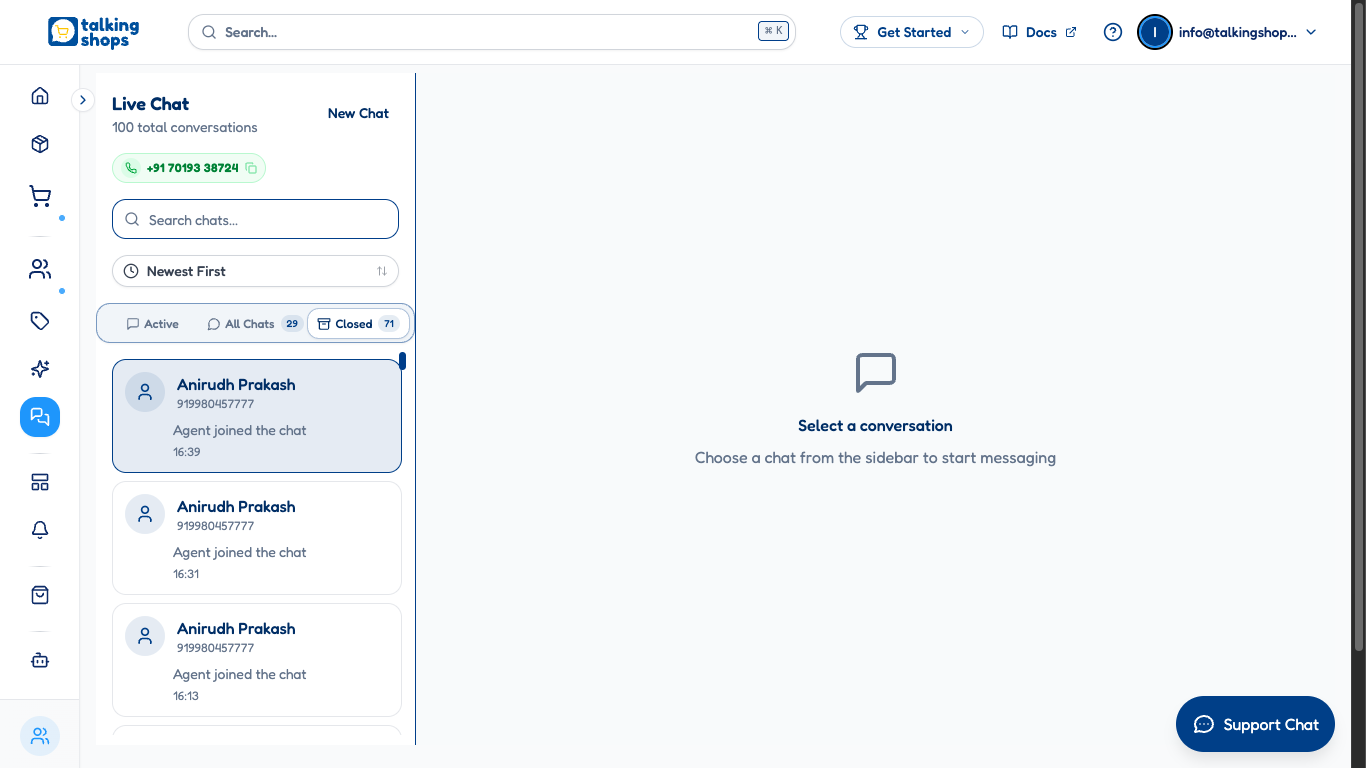Appearance
Live Chat Management
Target Audience
This guide is designed for support agents, team managers, and business owners who want to provide excellent customer service through live WhatsApp conversations.
Live Chat in Talking Shops enables your team to have real-time conversations with customers directly through WhatsApp. Whether responding to customer inquiries, handling complex issues, or providing personalized support, the live chat system ensures seamless communication between your team and your customers.
What is Live Chat?
Live Chat is a real-time messaging interface that allows your support team to communicate directly with customers through WhatsApp. It provides a comprehensive set of tools for managing conversations, tracking customer interactions, and ensuring excellent customer service.
Key Benefits
- Real-time Communication - Instant messaging with customers through WhatsApp
- Conversation Management - Organized view of all customer conversations
- Team Collaboration - Multiple agents can handle conversations efficiently
- Customer Context - Access to customer history and previous interactions
- Quick Responses - Pre-defined replies for faster customer service
- Handoff Support - Seamless transfer between bot and human agents
Understanding the Live Chat Interface
The Live Chat interface consists of two main sections:
1. Chat Sidebar
- Conversation List - View all active, bot-handled, and closed conversations
- Search Functionality - Find specific conversations quickly
- Filter Options - Sort conversations by date or status
- New Chat Creation - Start conversations with customers directly
2. Chat Interface
- Message History - Complete conversation timeline with customer
- Message Input - Send text, media, and templates to customers
- Customer Context - View customer details and conversation history
- Quick Actions - Access quick replies, product sharing, and notes
Conversation Types and Status
Conversation Categories
Active Conversations
- Currently ongoing chats between agents and customers
- Real-time messaging with immediate response times
- Priority handling for urgent customer issues
Bot Chats
- Conversations currently handled by the automated bot system
- Available for human agent intervention when needed
- Seamless handoff to human agents for complex issues
Closed Conversations
- Completed conversations that have been resolved
- Archived for future reference and quality assurance
- Accessible for review and customer history
Conversation Status Flow
New Customer Message → Bot Handling → Handoff (if needed) → Agent Response → Active Conversation → ClosedChat Lifecycle and Conversation Flow
Understanding how conversations move through different stages is essential for effective chat management. The Talking Shops platform provides a clear visual separation of conversation states through dedicated tabs.
Conversation Tabs Overview
The chat interface organizes conversations into three main tabs, each serving a specific purpose in the conversation lifecycle:
1. Active Tab
- Conversations currently being handled by human agents
- Real-time messaging with customers
- Priority conversations requiring immediate attention
- Shows conversation count indicator
2. All Chats Tab
- Complete view of all conversations across all statuses
- Includes both bot-handled and agent conversations
- Search and filter functionality available
- Historical conversation access
3. Closed Tab
- Completed and archived conversations
- Customer service resolution records
- Reference for quality assurance and training
- Can be reopened if customer responds
Detailed Chat Lifecycle with Screenshots
Step 1: Initial Bot Conversation (All Chats Tab)
 The "All Chats" tab shows all conversations, including those being handled by the bot system. Customer Anirudh Prakash's conversation appears here with "New" status.
The "All Chats" tab shows all conversations, including those being handled by the bot system. Customer Anirudh Prakash's conversation appears here with "New" status.
Step 2: Bot-to-Agent Handoff Process
 When clicking on a bot-handled conversation, agents can see the full conversation history. The "Intervention Required" message indicates when human agent involvement is needed.
When clicking on a bot-handled conversation, agents can see the full conversation history. The "Intervention Required" message indicates when human agent involvement is needed.
Step 3: Agent Intervention
 After clicking "Intervene", the conversation moves to the "Active" tab showing "Agent joined the chat" status. A notification confirms successful intervention.
After clicking "Intervene", the conversation moves to the "Active" tab showing "Agent joined the chat" status. A notification confirms successful intervention.
Step 4: Active Conversation Management
 Agents can now communicate directly with customers through the active conversation interface. The conversation shows agent status and full messaging capabilities.
Agents can now communicate directly with customers through the active conversation interface. The conversation shows agent status and full messaging capabilities.
Step 5: Closed Conversation (Closed Tab)
 When conversations end, they appear in the "Closed" tab with status indicators like "Agent joined the chat" or "Chat ended: session_timeout". These serve as historical records.
When conversations end, they appear in the "Closed" tab with status indicators like "Agent joined the chat" or "Chat ended: session_timeout". These serve as historical records.
Conversation Status Transitions
Bot-Handled → Active:
- Customer initiates conversation via WhatsApp
- Bot system handles initial interaction
- Agent identifies need for human intervention
- Agent clicks "Intervene" to take over conversation
- Conversation moves from "All Chats" to "Active" tab
Active → Closed:
- Agent resolves customer inquiry
- Agent ends conversation or session times out
- Conversation moves from "Active" to "Closed" tab
- Historical record preserved for future reference
Closed → Active (Reopening):
- Customer sends new message to closed conversation
- System automatically reopens conversation
- Conversation moves back to "Active" tab
- Agent can continue where previous conversation left off
Key Features During Lifecycle
Intervention Management:
- Clear indicators when bot conversations need human assistance
- Seamless handoff from automated to human support
- Context preservation during transitions
- Agent availability checking
Status Tracking:
- Real-time status updates across all tabs
- Visual indicators for conversation state changes
- Timestamp tracking for all status transitions
- Agent assignment and handoff logging
Search and Filtering:
- Search conversations by customer name or phone number
- Filter by conversation status and date ranges
- Quick access to specific customer conversations
- Historical conversation retrieval
Best Practices for Chat Lifecycle Management
Monitoring Active Conversations:
- Prioritize conversations in "Active" tab
- Monitor response times and customer satisfaction
- Ensure timely follow-up on pending issues
- Coordinate with team members for complex cases
Reviewing Closed Conversations:
- Regular review of resolved conversations for quality assurance
- Identify common customer issues and improve bot responses
- Track agent performance and customer satisfaction trends
- Use closed conversations as training resources
Managing Handoffs:
- Intervene in bot conversations when customer needs exceed automated capabilities
- Provide smooth transitions with complete context preservation
- Document reasons for intervention for future improvements
- Monitor handoff success rates and customer feedback
Getting Started with Live Chat
Accessing Live Chat
- Navigate to Dashboard → Live Chat
- The chat interface will load with your conversation sidebar
- View available conversations in the sidebar tabs
Understanding the Layout
Chat Sidebar (Left Panel):
- Tab navigation for different conversation types
- Search bar for finding specific conversations
- Sort controls for conversation organization
- Conversation cards with customer details
Main Chat Area (Right Panel):
- Customer information and conversation details
- Message history with timestamps
- Message input area with formatting options
- Quick actions and tools panel
Managing Conversations
Viewing Available Conversations
The sidebar shows conversations organized by tabs:
Active Tab
- Shows conversations currently assigned to agents
- Displays customer name, last message, and timestamp
- Indicates unread messages with visual indicators
All Chats Tab
- Complete list of all conversations
- Includes both bot-handled and agent conversations
- Search and filter functionality available
Closed Tab
- Previously resolved conversations
- Archived for reference and review
- Can be reopened if customer responds
Starting New Conversations
- Click the "New Chat" button in the sidebar
- Enter customer details:
- Phone Number (required)
- Customer Name (optional)
- Initial Message (optional)
- Click "Start Chat" to begin the conversation
Accepting Bot Handoffs
When the bot encounters complex queries, it can hand off conversations to human agents:
Handoff Notifications
- Visual indicators in the sidebar for pending handoffs
- Handoff reason and context provided
- Customer waiting time displayed
Accepting Handoffs
- Click on the conversation with pending handoff
- Review the handoff context and reason
- Click "Accept Chat" to take over the conversation
- The conversation moves to Active status
Conversation Features
Message Types
Text Messages
- Standard text communication with customers
- Support for emojis and special characters
- Character limits based on WhatsApp requirements
Media Messages
- Images - Send product photos, screenshots, and documentation
- Documents - Share PDFs, invoices, and other files
- Audio Messages - Voice notes and audio clips
Template Messages
- Pre-approved WhatsApp templates for structured communication
- Order confirmations, shipping updates, and notifications
- Variable personalization for customer-specific information
Message Formatting
The chat interface provides WhatsApp-style formatting:
Text Formatting:
- Bold - Use asterisks around text:
*bold text* - Italic - Use underscores around text:
_italic text_ - ~Strikethrough~ - Use tildes around text:
~strikethrough text~ Monospace- Use backticks around text:`code text`
Quick Replies
What are Quick Replies? Pre-defined message templates that enable fast, consistent responses to common customer inquiries.
Benefits:
- Faster response times
- Consistent messaging
- Reduced typing errors
- Professional communication
Using Quick Replies:
- Click the quick replies button in the message input area
- Browse categories or search for specific replies
- Click on a quick reply to send it instantly
- Customize the message before sending if needed
Managing Quick Replies:
- Create custom quick replies for your business
- Organize replies by categories
- Edit or remove outdated replies
- Reset to default templates if needed
Customer Context and Information
Customer Information Panel
Basic Information:
- Customer name and phone number
- Conversation start date and time
- Current conversation status
Conversation History:
- Previous interactions with the customer
- Order history and purchase behavior
- Previous support conversations
- Customer preferences and notes
Contact Management:
- Add customer notes for future reference
- Update customer information
- Tag customers for categorization
- Set reminders for follow-up actions
Order Integration
Order Context:
- View customer's recent orders
- Check order status and tracking information
- Access order details and history
- Handle order-related inquiries efficiently
Product Information:
- Share product details directly in chat
- Send product images and descriptions
- Check product availability and pricing
- Process orders through conversation
Advanced Chat Features
Notes and Internal Communication
Conversation Notes:
- Add internal notes visible only to team members
- Track important information and follow-up actions
- Document customer preferences and special requirements
- Coordinate with other team members
Internal Communication:
- Tag team members in conversations
- Share information between agents
- Coordinate handoffs between team members
- Maintain continuity in customer service
Product Sharing
Product Selector:
- Browse and search your product catalog
- Share product details directly in chat
- Include product images and pricing
- Generate purchase links for customers
Product Information:
- Real-time inventory status
- Product descriptions and specifications
- Pricing and discount information
- Product variants and options
Conversation Analytics
Performance Metrics:
- Response times and conversation duration
- Customer satisfaction scores
- Resolution rates and outcomes
- Agent performance tracking
Quality Assurance:
- Review conversation quality
- Monitor agent performance
- Identify training opportunities
- Ensure compliance with service standards
Team Collaboration
Multi-Agent Support
Conversation Assignment:
- Automatic assignment based on availability
- Manual assignment to specific agents
- Load balancing across team members
- Specialist routing for specific issues
Agent Status Management:
- Available/Busy/Away status indicators
- Break and after-hours management
- Capacity management and limits
- Performance monitoring
Handoff Management
Bot-to-Agent Handoffs:
- Automatic triggers for complex queries
- Context preservation during handoffs
- Agent availability checking
- Customer waiting time management
Agent-to-Agent Handoffs:
- Transfer conversations between specialists
- Share context and conversation history
- Maintain customer experience quality
- Coordinate follow-up actions
Best Practices for Live Chat
Communication Guidelines
Response Time Standards:
- Immediate (under 1 minute): High-priority issues
- Quick (1-5 minutes): Standard inquiries
- Reasonable (5-15 minutes): Complex issues
Professional Communication:
- Use proper grammar and spelling
- Maintain professional and friendly tone
- Follow brand voice guidelines
- Respect customer privacy and confidentiality
Problem Resolution:
- Listen actively to customer concerns
- Ask clarifying questions to understand issues
- Provide clear and accurate information
- Follow up to ensure satisfaction
Efficiency Tips
Multi-Tasking:
- Handle multiple conversations simultaneously
- Use quick replies for common questions
- Leverage templates for routine responses
- Prioritize urgent conversations effectively
Time Management:
- Set appropriate response time expectations
- Use status indicators effectively
- Take breaks to maintain quality
- Escalate complex issues appropriately
Quality Assurance
Conversation Quality:
- Review conversations for accuracy and completeness
- Ensure all customer questions are addressed
- Verify information provided is correct
- Maintain professional standards
Customer Satisfaction:
- Request feedback on service quality
- Monitor satisfaction scores and trends
- Address customer complaints promptly
- Continuously improve service delivery
Troubleshooting Common Issues
Technical Issues
Connection Problems:
- Check internet connectivity
- Refresh the chat interface
- Clear browser cache and cookies
- Contact technical support if issues persist
Message Delivery Issues:
- Verify WhatsApp Business API status
- Check message content compliance
- Confirm customer contact details
- Monitor delivery status indicators
Performance Issues:
- Close unnecessary browser tabs
- Check device performance
- Report slow loading times
- Use recommended browsers and devices
Customer Service Issues
Difficult Customers:
- Remain calm and professional
- Listen to customer concerns patiently
- Escalate to supervisors when necessary
- Document interactions for future reference
Complex Inquiries:
- Research information thoroughly
- Consult with team members or specialists
- Set realistic expectations for response times
- Follow up to ensure complete resolution
Language Barriers:
- Use translation tools when appropriate
- Keep messages simple and clear
- Avoid slang and complex terminology
- Confirm customer understanding
Mobile and Desktop Experience
Desktop Features
Enhanced Interface:
- Split-screen view with sidebar and chat area
- Keyboard shortcuts for faster navigation
- Multiple chat windows for multitasking
- Advanced search and filtering options
Productivity Tools:
- Copy and paste functionality
- Multiple browser tabs support
- Screen sharing for technical support
- Integration with other business tools
Mobile Optimization
Responsive Design:
- Touch-optimized interface
- Swipe gestures for navigation
- Mobile-friendly keyboard input
- Adaptive layout for different screen sizes
On-the-Go Support:
- Push notifications for new messages
- Offline message caching
- Quick response templates
- Essential features prioritized
Security and Privacy
Data Protection
Customer Privacy:
- Secure message transmission
- Data encryption for sensitive information
- Access controls and permissions
- Compliance with privacy regulations
Information Security:
- Regular security updates
- Secure authentication methods
- Audit logs and monitoring
- Data backup and recovery
Compliance
WhatsApp Business Policies:
- Follow WhatsApp's business messaging guidelines
- Maintain message content standards
- Honor customer opt-out requests
- Respect messaging time windows
Industry Regulations:
- GDPR compliance for European customers
- Data protection law adherence
- Industry-specific requirements
- Local regulation compliance
Getting Help and Support
Support Resources
- In-App Help: Comprehensive documentation and tutorials
- Email Support: info@talkingshops.com
- WhatsApp Support: +91 70193 38724
- Live Chat: Available in your dashboard
Training Resources
- Video Tutorials: Step-by-step guides for live chat features
- Knowledge Base: Detailed articles and best practices
- Webinars: Live training sessions and Q&A
- Community: User forums and experience sharing
Advanced Support
- Onboarding Assistance: Personalized setup and training
- Custom Configuration: Tailored setup for specific business needs
- Integration Support: Help with third-party integrations
- Premium Support: Enhanced support packages available
Next Steps:
- Access your live chat dashboard
- Set up quick replies for common responses
- Configure team member access and permissions
- Review conversation analytics and performance
Pro Tip
Start by setting up comprehensive quick replies for your most common customer inquiries. This will significantly improve your response times and ensure consistent messaging across your team.